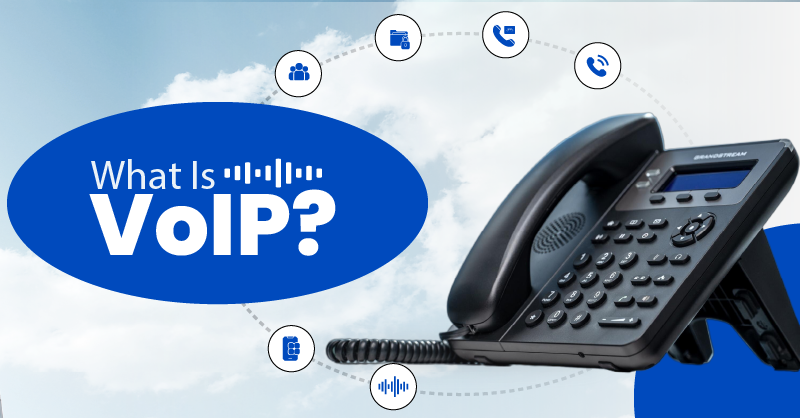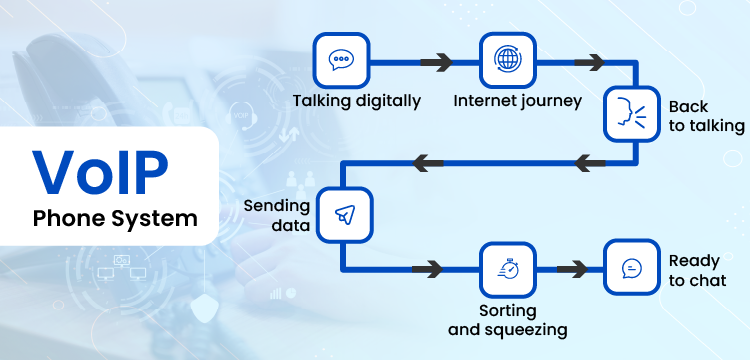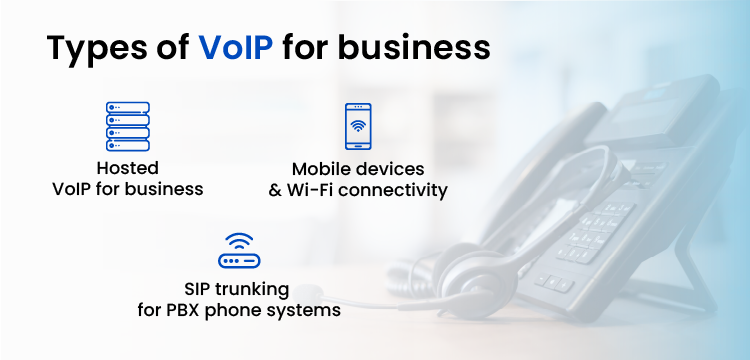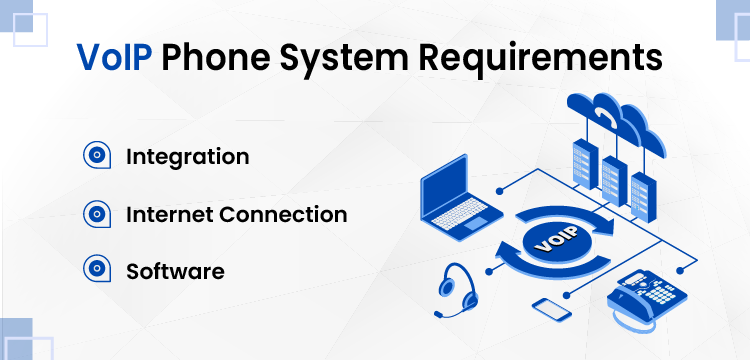What is VoIP and How Does VoIP Work? The Beginner’s Guide

Will you believe me if I say you can just zoom your calls over the internet to your families and friends, wherever they are, by just dialing their number?
Well yes, thanks to VoIP phone technology that has bid goodbye to the jumbled cords and jaw-dropping phone bills that surely ought to haunt everyone at the end of the month.
So what is VoIP?
How does a VoIP phone work? We will discuss all these in the blog post below. After which you will be thrilled to learn the amount of cash saved.
Shall we start?
Table of Contents
What Is VoIP? The Newbie’s Guide to Voice over IP
VoIP (Voice over Internet Protocol) is a popular communication technology that uses internet connection to connect devices for real-time video and voice calling.
This technology converts your voice (analog) into machine-understandable data packets (digital) and transmits them across the internet.
When the packets reach the recieving end, these signals are reassembled into sound, enabling a successful voice call.
How Does VoIP Work? Introduction To VoIP Phone Systems
The technology behind its work is simple. To be right, a voice over ip call is like talking on the phone as usual but using an internet connection.
Now, let us see in detail its working clature:
1. Talking digitally
When you speak into a VoIP phone or device, your voice turns into digital signals, just like how music becomes MP3 files.
2. Sending data
These digital signals then get split into tiny packets. Each piece travels over the internet with a label saying who’s talking and who’s listening.
3. Internet journey
Then these packets or pieces use your internet connection to reach the VoIP company’s computers.

VoIP vs. Landline — Differences
In the section below, we will speak first about Traditional Landlines. These landlines rely on a PSTN (Public Switched Telephone Network) that makes use of copper wires to send voice calls.
These systems are simple and offer good quality. However, they have limited features and are pricier than VoIP. But how is VoIP cheaper?
Types of VoIP Technologies + How They Work
1. Hosted VoIP for business
- A hosted voice over ip phone system makes use of multiple devices that comprises smartphones and others within a cloud phone system, or cloud PBX.
- In such a case, admins control the entire setup and give permissions using an interface.
2. SIP trunking for PBX phone systems
- While some companies use hybrid systems to replace hardwired phone lines, others use VoIP – SIP trunking to set up multiple internet lines.
- These SIP trunks manage calls between the voice-over internet protocol provider and the business, directly switching inbound and outbound calls.
3. Mobile devices & Wi-Fi connectivity
- Since the growth of mobile technology, unified communication has grown substantially well.
- Paving way for remote and mobile workers who can handle business calls using a VoIP application from anywhere.

What VoIP Equipment Do You Need?
If you are thinking of setting up a IP-based Voice Communication system for your business, then here are few requirements:
1️⃣ Hardware
Modem & Router – It is these that allows voice over ip (VoIP) systems to send and receive data.
SIP Phones – All the VoIP phones are SIP phones that help service providers to establish phone calls.
Softphones – You can make VoIP calls using a cellphone, laptop, and desktop.
2️⃣ Internet Connection
Quality Connection – A stable internet connectivity is important for VoIP calls. Therefore, a minimum of 100 Mbps is required. Best is to go for fiber optic.
Bandwidth – VoIP calls require less bandwidth than doing a live streaming. Therefore, a standard bandwidth is 100 Kbps per device.
3️⃣ Software
VoIP Service Provider – Always choose the right voice-over internet protocol system provider that offers call recording, forwarding, voice mail, and other features.
Provisioning Software – Your choice of VoIP should provision your phones and help configure your system.

Top VoIP Phone Features
VoIP phone systems, in addition to cost saving functionality, offers other features like:
1. Call Management
- Automatic Call Distribution (ACD): An ACD directs calls to available agents based on set criteria thus boosting quicker response time.
- Interactive Voice Response (IVR): Uses automated menus or logs to guide callers thereby reducing waiting times.
2. Collaboration and mobility
- Video Conferencing: Easily fosters face-to-face interactions with colleagues or clients, regardless of the location.
- Voicemail-to-Email: Receives voicemail messages right to your inbox that allows you to respond via voice message.
3. Integration and customization:
- CRM Integration: Syncs call data with CRM software.
- Instant Messaging: Allows agents to immediately exchange text messages with customers.
Key Benefits of Using VoIP Systems
Below are some of the top benefits of using a VoIP phone systems:
- 1Cost Savings: Compared to traditional phone systems like cell or landline it lowers call costs for all international phone lines.
- Scalability: Allows to easily add or remove lines and features whenever business grows.
- Improved Features: Gives access to advanced features like call forwarding and video conferencing.
- Better Collaboration: Facilitates seamless collaboration among team members, irrespective of location.
- HD-quality Calls: Allows to add quality within calls when there is a stable internet connection.
Selecting the Right VoIP Phone System
After reading all these, your next big question can be how to choose the right VoIP phone system when there are so many in the market.
Well, the answer to it is simply to use MirrorFly’s powerful SIP/VoIP solution for great voice-calling experiences. And here’s how the provider is known to be the best:
- 100% Customizable- Personalize any feature on your VoIP calling app.
- Call Configuration – Configure VoIP calls to meet the needs of your users.
- Hot Desking – Enable users of your company to use the same IP phones
Wrapping Up!
To wrap up, voice-over IP technology has revolutionized the way businesses interact with customers as it offers flexible and cost effective options.
Plus, VoIP renders greater benefits than the traditional phone lines with just a stable internet connection. So, whether you are a small business or a large enterprise, VoIP can improve communication capabilities, streamline support operations, and offer connected experience.
But, you can experience all these with the right VoIP provider. So, ready to make a switch? Try MirrorFly!
Frequently Asked Questions:
VoIP is used for making voice calls over the internet instead of traditional phone lines. It allows people to communicate using broadband internet connections, often at lower costs than conventional telephone services.
Here’s a simple step-by-step explanation of how VoIP works: 1. Audio capture: Your device’s microphone picks up your voice. 2. Digitization: The analog voice signal is converted into digital data. 3. Packetization: The digital data is split into small packets. 4. Transmission: These packets are sent over the internet to a VoIP server. 5. Routing: The server directs the packets to the recipient’s internet connection. 6. Reassembly: The recipient’s device receives and reassembles the packets. 7. Conversion: The digital data is converted back into an audio signal. 8. Playback: The recipient hears your voice through their device’s speakers. This process happens almost instantaneously, allowing for real-time voice communication over the internet.
VoIP (Voice over Internet Protocol) is a technology that enables voice calls and other communication forms over the internet instead of traditional phone lines. It can be used on various devices like computers, smartphones, and specialized VoIP phones. Key features of VoIP include: 1. HD voice quality 2. Geographic flexibility for remote work 3. Integration with CRM and messaging software 4. Caller ID 5. Automatic call distribution 6. Voicemail accessible from any internet-connected device 7. Conference and three-way calling 8. Call waiting, transferring, and forwarding 9. Auto attendant 10. Call recording 11. Call Flip 12. Call notify 13. Customizable routing options These features enhance communication capabilities for businesses and individuals, offering flexibility and advanced functionalities beyond traditional phone systems. Copy.
An IP-based phone system, also known as a VoIP (Voice over Internet Protocol) phone system or IP PBX, is a communication system that uses the internet to make and receive calls. It allows businesses and individuals to conduct voice communications over an internet connection instead of traditional phone lines. It enables features like call routing, voicemail, and conferencing on user devices. Most of the time, IP based phone systems are cheaper when compared to conventional telephone systems.
The main differences between a telephone and an IP phone are: 1. Connection: Traditional phones use copper wires; IP phones use the internet. 2. Mobility: IP phones work anywhere with the internet; landlines are location-specific. 3. Cost: IP phone services are usually cheaper. 4. Features: IP phones offer more advanced features. 5. Reliability: Traditional phones work during power outages; IP phones require power and internet. IP phones provide more flexibility and features, while traditional phones offer reliability in specific situations.
PBX SIP trunking is a VoIP technology that enables businesses to make and receive calls over the internet instead of traditional phone lines. It provides virtual connections to a company’s private branch exchange (PBX). This ensures sufficient bandwidth for high-quality voice communications. The system allows for clear calls even during busy periods, as long as the PBX isn’t overloaded.
Popular examples of VoIP applications include Skype, WhatsApp, Google Meet, FaceTime, RingCentral, Viber, Google Hangouts, and Facebook Messenger. These apps allow users to make voice and video calls over the internet, often for free or at lower costs than traditional phone services, making communication more accessible and affordable.
Ready To Build Your Own VOIP Calling Solution
Get our enterprise-grade communication solution, that can be set up on your company servers.
Request Demo100% customizable
White-label solution
Full source code
